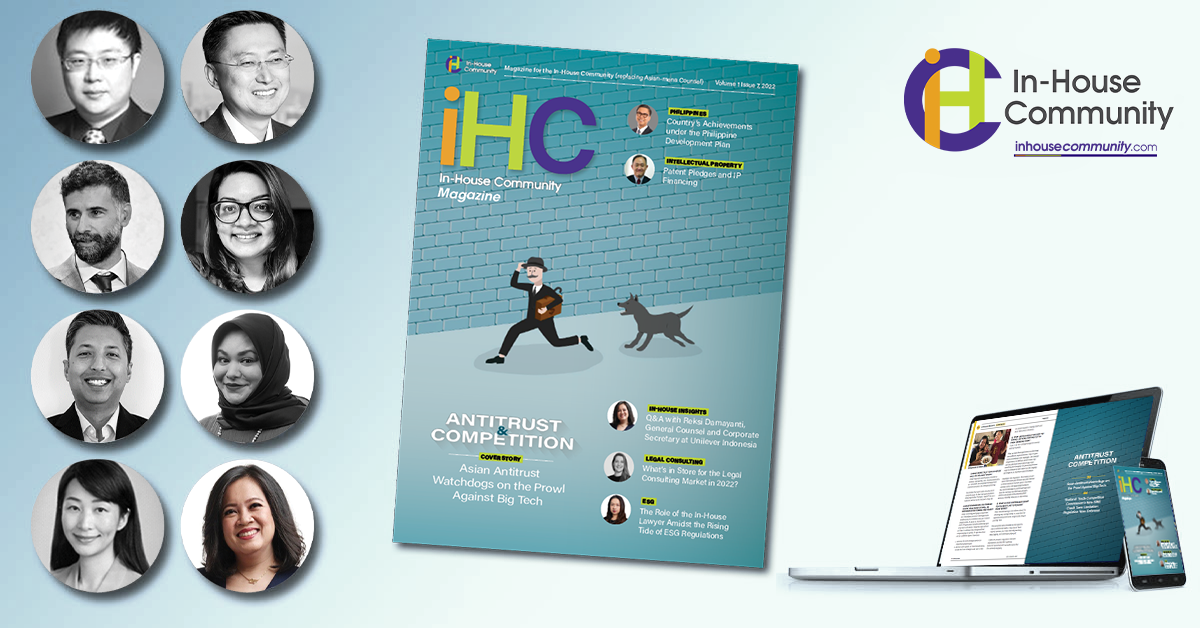
The pandemic that hit the world in 2020 was a boon for Big Tech and the digital economy. Amazon, Facebook, Google, WhatsApp, and Apple along with Asian tech giants Alibaba, Naver, and Rakuten to name a few, profited by keeping tabs on users, watching and capitalizing on their data. Today they have come under fire as antitrust authorities worldwide are watching. Competition watchdogs are homing in on killer acquisitions related to data and scrutinising agreements of platform operators for unfair trade practices.
Antitrust authorities have turned the tables and are watching and questioning every move Big Tech makes. The story is no different in Asia, though some might say the magnitude may be less aggressive than the scene in the US or Europe.
Asian authorities like their peers in Europe and the US have become skeptical of transactions involving data and digital markets. Many apply existing antitrust tools to preempt potential anti-competitive conduct while others contemplate new rules to rein in the digital market. Reducing merger thresholds is in vogue for deals involving the digital economy.
Regulators are invoking novel theories of harm outside of the traditional antitrust analysis and considering broader topics such as data power, innovation, network effects, and sustainability in their review.
“Themes across various jurisdictions are very similar and we are seeing convergence in enforcement in the digital economy,” said Natalie Yeung, Hong Kong-based partner at Slaughter & May.
Effective Enforcement
While the number of investigations in the digital sector may be relatively lower in Asia, they are not ineffective, lawyers at Baker McKenzie said.
China’s State Administration for Market Regulation (SAMR) penalized Alibaba USD 2.8 billion in April 2021 and Meituan USD 537 million in October 2021 for abusing their dominant market position and forcing merchants on their respective platforms not to transact with competing platforms. The industry has since toed the line as Xun Yang, a partner at Links Law Offices, said that “this is no longer an issue.”
Even as the Taiwan Fair Trade Commission (TFTC) concluded its investigation into Google’s Android operating system finding no evidence of wrongdoing, the authority said it would keep a watchful eye on the search engine.
Japan recently closed an investigation against Rakuten for “abuse of superior bargaining position”, after the e-commerce marketplace submitted changes to its “free shipping” policy.
Action taken by Asian antitrust authorities ranges from soft- to hard-enforcement, as some regulators revised guidelines, while others increased advocacy efforts, conducted markets studies, and carried out investigations. Soft-enforcement initiatives have helped Asian antitrust watchdogs get up to speed and build capacity around the various competition issues in the digital sector, the Baker McKenzie lawyers said.
The Chinese government has clamped down on Alibaba, Tencent, Meituan, among other homegrown digital giants. Though the AntiMonopoly Law (AML) is one of the many tools in China’s antitrust arsenal, it is “arguably the more frequently used on the digital sector since late 2020,” Stephanie Wu, partner at East & Concord Partners said.
It is early to conclude the impact on China’s digital economy since the government tightened scrutiny. However, Xun pointed out that big tech giants are paying attention to compliance.
Two concerns associated with China’s digital economy remain, Wu said. The exclusive arrangements between platform giants and their upstream or downstream counterparts and incidences of gun-jumping as parties fail to notify, she noted, citing Tencent/China Music deal.
Enforcement by Indonesia’s antitrust authority in the digital sector has been “quite adequate”, Winnie Yamashita Rolindrawan, partner at SSEK Legal Consultants said. This is despite the “continuously evolving market” with “new and innovative products” challenging the competition authority.
The Indonesian Business Competition Commission (Komisi Pengawas Persaingan Usaha or KPPU) should maintain an aggressive stance where no reasonable socio-economic justification of antitrust violation exists, Rolindrawan said. She cautioned that the clampdown on the digital sector could unduly restrict innovation and development.
India’s antitrust authority might be seen to have adopted an aggressive stance as opposed to its earlier position to err on the side of caution given the recent spurt of antitrust inquiries targeting Big-tech firms.
India’s antitrust authority might be seen to have adopted an aggressive stance
Unlike most other regulators, however, the Competition Commission of India (CCI) does not have the flexibility to pick and choose its battles once it receives a complaint, independent competition lawyer Rahul Rai said. The one exception was the self-initiated investigation into WhatsApp’s privacy policy change.
The CCI is duty-bound by the Competition Act to assess every complaint received, and issue a formal decision, Rai pointed out. While CCI’s orders initiating inquiries cannot be appealed, its decision to not initiate can be contested before the appellate tribunal. “This unique quirk in Indian law possibly incentivises the CCI to err on the side of initiating inquiries,” Rai notes.
As the CCI has yet to conclude investigations in most cases involving Big-tech companies, Rai said it is early to conclude whether the authority has adopted an aggressive stance.
Strengthen Regulatory Arsenal
Many antitrust authorities are questioning whether existing tools suffice or whether there is a need for fresh regulations to determine what Big Tech companies can or cannot do, Yeung said.
The jury is still out on whether amending existing legislation is warranted. Baker McKenzie lawyers cautioned that changes in existing regulations should be weighed against the dynamic, fast-moving, and highly innovative characteristics of digital markets.
China’s AML is broad enough to cover all types of anti-competitive conducts, Wu said. However, as businesses welcome certainty, clarifications to broadly-termed provisions can come in many forms, including antitrust guidelines, she added.
Competition authorities need to re-tool their skillsets to understand data, have the necessary IT material, and the people who can understand the business and pricing models, Ruben Lapa Maximiano, senior competition expert at the Organization for Economic Co-operation and Development (OECD) said.
The Japanese diet passed the Bill on Improving Transparency of Transactions of Digital Platform Operators in 2019, which came into effect in 2020, Akira Inoue, partner at Baker McKenzie’s Tokyo office noted.
It is not that the CCI lacks the tools to undertake effective enforcement actions, but rather its success in taking effective enforcement actions depends on the strength of its bench, budgetary support, and ability to act independent of any external influence, independent competition lawyer Shruti Aji Murali said.
CCI’s annual budget is paltry at USD 8.7 million in 2020-21 against the US Federal Trade Commission’s budget of USD 350 million for 2021, Murali said.
CCI’s resources will always be stretched, and thereby affect the quality of its decision-making, Murali pointed out. “Eventually if CCI’s decisions aren’t upheld by the appellate tribunal and the Supreme Court, they would lose deterrence value,” she added.
Asian competition authorities are still developing and refining their approach to analyse digital platforms, Maximiano said. The novelty of it also explains the importance of international cooperation so agencies can learn from the developments and cases encountered by others, he added, citing the example of Thailand.
Thailand has set up a committee to prepare legislation for the digital sector and has closely been following the European Commission’s proposal for the Digital Markets Act and Digital Services Act.
Thailand is not alone. Several antitrust authorities have set up digital units, including the Japan Fair Trade Commission (JFTC), which set up the Office of Policy Planning and Research for Digital Markets in April 2020. Malaysia has also announced similar plans to do so, Maximiano said.
As Asian competition agencies try to better understand how digital markets work, many including Australia, India, and Singapore have undertaken market studies, while Malaysia and Thailand recently announced their plans to conduct similar studies in 2022.
Changes On The Anvil
The digital economy is on the radar of most Asian authorities, with Hong Kong’s Competition Commission being one of the youngest enforcement agencies to target the digital economy, as its executive director for operations, Jindrich Kloub said.
Hong Kong had been lagging behind other jurisdictions but earlier this week, the commission announced its investigation into food-delivery platforms Foodpanda and Deliveroo for using their market position to restrict potential rivals, and enter into exclusive tie-ups with restaurants.
The digital economy is also a focus area for China as SAMR’s new chief, Gan Li said.
The Chinese authorities have invested more efforts to tackle challenges arising from the digital sector, Laura Liu, senior counsel at FenXun Partners said. Last November, China’s National Anti-monopoly Bureau identified platform economy, technology innovation, and data security, as key priority areas for antitrust enforcement, she added.
Xun anticipated the issuance of further guidance shortly and cited three key issues, namely the determination of monopoly behavior, the application of the “safe harbor rule”, and the scope of vertical monopoly agreements other than price maintenance.
Last December, KPPU said that it is closely monitoring the digital sector with an emphasis on digital payment, marketplace, and online platform players, Rolindrawan pointed out.
The KPPU has repeatedly expressed its intentions to amend certain regulations to address potential issues in the digital economy. Rolindrawan cited the need for a new methodology in determining geographic market in the digital economy given the increase in the cross-border nature of digital platforms. There is a possibility of changing the method of calculating market share based on data flow rather than the turnover in the digital sector, she added.
Holistic Approach
Adopting a holistic approach in regulating the digital economy involves collaboration among various regulators including antitrust, consumer protection, and data privacy, and would address the fast-emerging issues in the sector.
Adopting a holistic approach in regulating the digital economy involves collaboration among various regulators
China has deployed many tools aside from AML to regulate the platform economy, which ensures efficiency, Wu said.
Liu agreed and added that a holistic approach promotes innovation, creates new drivers of economic development, and benefits China’s society.
With the misuse of personal information being rampant in the digital economy, Xun noted that the enforcement of data protection laws is aimed at transforming the digital economy “from fastpaced development to healthy development.”
“The fast development of the digital economy and the rapid growth of tech giants has left the compliance issue behind,” Xun said.
The Competition and Consumer Commission of Singapore though best-placed to handle issues related to the digital economy, has adopted a holistic, whole-of-government approach, Harikumar Pillay, principal at Baker McKenzie Wong & Leow said. It engages and cooperates with various governmental bodies in Singapore, he said, citing the Personal Data Protection Commission.
While some countries believe in adopting a holistic approach, a regulatory turf war broke out in South Korea last year as both the Korea Fair Trade Commission (KFTC) and the Korea Communications Commission (KCC) came out with similar legislation to rein in platform operators. Due to the clash between the two agencies as to which should oversee the platform economy, two online-platform legislations – KFTC’s Online Platform Fairness Act and the KCC-backed Online Platform User Protection Act – failed to see the light of day last July.
There exists some degree of overlap between the two authorities in regulating the digital economy, Peter Kwon, partner at RPC said. KCC took the lead in September 2021 and introduced legislation prohibiting app market operators – the likes of Apple and Google – from forcing certain in-app payment methods.
If the two above proposed legislation are enacted, the KCC and the Ministry of Science and ICT will have the authority to regulate digital platform operators in addition to the KFTC, Kwon said. The Korean antitrust watchdog implemented new rules in 2020 aimed at governing the unfair trade practices of major platform operators, which included self-preferencing in mobility and online shopping of multi-homing in app markets.
Legislators and regulators should be made aware of the unintended consequences of adopting regulations should competition principles not be integrated and/or considered in their design, as this could lead to more market power entrenchment, Maximiano cautioned.
Convergence
Asian antitrust authorities have not deviated much in their approach when dealing with competition issues that arise in the digital economy. While reference is taken from their peers in the US and Europe, Asian authorities adopt a slightly more cautious approach, Baker McKenzie lawyers observed. The differences in their approach “have rightly been tailored to their respective domestic/national competition landscapes,” they explained.
China’s enforcement against platform giants coincides with the global trend. The country seems to be catching up with the West in its enforcement against unfair trade practices of tech giants with SAMR having imposed penalties on more than a hundred acquirers for gun-jumping, having failed to notify the authority and seek merger clearance.
The intersection between antitrust and data privacy laws involving tech giants especially when it comes to mergers has become a global concern further attracting the attention of enforcers, Wu said.
Xun cited market rumors that tech giants in China will be asked to divest the capital investment/acquisition division. This move could be in response to tech giants’ aggressive expansion into related businesses in the digital sector, he explained, adding that it would prevent tech giants from gaining too much power.
Similarly, KFTC’s proposal to amend laws to address platform operators’ abuse of dominant position reflects the global trend, Kwon said. Given the unique ways in which domestic platform operators such as Naver and Kakao operate, he cautions that Korean regulators should consider competing factors such as fostering innovation and regulating monopolistic behaviors of platform operators.
South Korea set the ball rolling when it became the first jurisdiction to pass legislation forcing Apple to open up to third-party payment processors. The Netherlands followed suit. Apple and Google may be forced to introduce alternative in-app payment systems in other jurisdictions as well.
Disclaimer: All views are personal and do not reflect that of the organization. The views shared are not intended for any legal advice and are for general information and education purposes only.

Xun Yang, Llinks Law Offices Xun Yang is a partner at Llinks Law Offices, focusing on IP/IT practice, including IP protection, cybersecurity, and regulatory matters as well as investment in the high-tech areas. |

Peter Kwon, RPC Peter Kwon is a Partner in the Commercial Disputes team at RPC and heads up the firm’s Korea Desk. Specialising in financial services, asset management, anti-corruption, and commercial disputes generally, Peter also has extensive contentious and non-contentious regulatory experience. |

Ruben Lapa Maximiano, OECD Ruben Lapa Maximiano is a Senior Competition Expert at the OECD in Paris. At the OECD he is responsible for the work on competition policy in the Asia Pacific region and coordinates the work on the Covid-19 crisis in the Competition Division. |

Shruti Aji Murali, ICW Shruti Aji Murali is one of the founding members of ICW and serves as a senior research fellow. She has more than six years of experience in practicing competition law at (erstwhile) Amarchand Mangaldas, Mumbai, and AZB & Partners, New Delhi, where she advised global and Indian companies. |

Rahul Rai Rahul Rai is an independent competition lawyer. He focuses on contentious behavioral investigations, strategic merger control, and advocacy on competition policy. He was earlier a senior associate with AZB & Partners. Rahul has worked with the Competition Commission of India (CCI) on its advocacy initiatives and was part of the working group responsible for formulating the CCI’s merger control regulations. |

Winnie Yamashita Rolindrawan, SSEK Winnie is a partner at SSEK, which she joined in 2007. She has represented major domestic firms and multinational companies in a variety of transactions. She has worked on numerous projects involving M&A, financial services and fintech, data privacy, pharmaceuticals and healthcare, corporate and commercial matters, foreign investment, e-commerce, and real estate and property (particularly hotels). |

Stephanie Wu, East & Concord Stephanie is a partner in East & Concord’s Shanghai office. She specialises in antitrust and competition law and advises on all aspects and phases of anti-monopoly law, including compliance, investigations, merger filings, antitrust private litigation, and fair competition review. |
* This article was first published in the Feb 2022 issue of the IHC Magazine. You can read/download the magazine here.
















